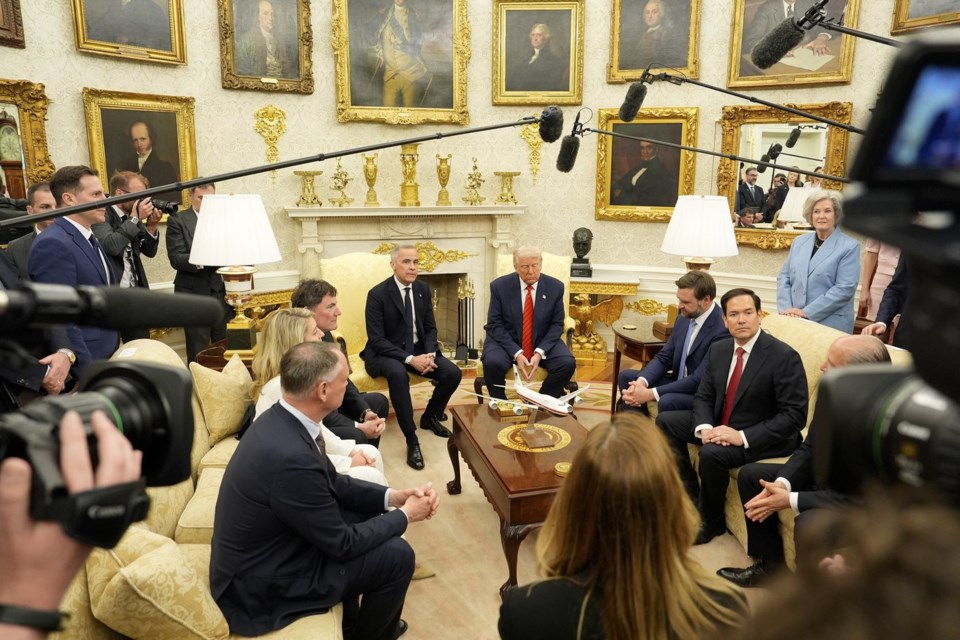WASHINGTON — Canada will never become a U.S. state, Prime Minister Carney declared to President Donald Trump in public and private during White House meetings both leaders described as productive and cordial.
While most of Carney's attention remained focused on pressing Canada's case against Trump's tariffs and launching serious trade discussions, the president's obsession with turning Canada into an American state was still a focal point.
The president assured reporters he was still keen on annexing Canada and Carney acknowledged that Trump brought it up again during private discussions.
The prime minister said he pressed Trump to drop the idea and repeatedly told him it will never happen.
"I would go back to showing the difference between a wish and a reality," Carney told reporters on the balcony of Canada's embassy in Washington following the meeting.
"I've been clear throughout, on behalf of Canadians, that this is never going to happen. Canada is not for sale and never will be for sale," he said, echoing remarks he made earlier while sitting next to Trump in the Oval Office when the TV cameras were rolling.
Carney said he feels better about America's trade "posture" but did not offer details of what was discussed and said it is only the beginning of talks.
"The breadth of the discussions and how concrete the discussions were — these are the discussions you have when you're looking to find solutions, rather than laying down terms," Carney told reporters.
The prime minister is expected to brief Canada's premiers on Wednesday about his first in-person meeting with Trump. Ontario Premier Doug Ford said Tuesday Carney appeared to have "held his own" with Trump, while Alberta Premier Danielle Smith said she hopes this is a chance to reset relations with the U.S.
Carney had said the meetings would launch talks on a larger economic and security agreement between Canada and the United States. The Canada-U.S.-Mexico Agreement on trade, called CUSMA, was negotiated during the first Trump administration.
Trump went ahead with economywide tariffs against Canada in March, only to partially walk back the duties a few days later on imports compliant with CUSMA rules. Canada was also hit by steel, aluminum and automobile tariffs.
Trump's actions hint his team still values the North American trade deal. The president left Canada and Mexico out of his global tariff agenda and provided further CUSMA carveouts for the automobile industry.
Trump on Tuesday said CUSMA was very effective, adding "it’s still very effective." The president, however, described it as a "transitional deal" and said he didn't know "if it's necessary anymore."
Carney said Canada is also looking to change some aspects of the continental trade pact. The prime minister pointed to the national security exemptions in trade law that allowed Trump to slam Canada with tariffs — linked to baseless claims about fentanyl trafficking over the Canadian border into the U.S.
The public portion of the high-stakes meeting was largely cordial, if tense. Trump leaned in at one point and — citing the combative Oval Office meeting in February with Ukrainian President Volodymyr Zelenskyy — said the meeting with Carney would remain "very friendly."
Carney matched Trump's body language and even mirrored the president's fist pump to the cameras when he greeted the prime minister at the White House entrance.
At the meeting's outset , Carney called Trump a "transformational" president focused on the economy and tackling illegal opioids. Carney said he hoped to adopt a "similar focus" on the economy and border security and place a "much greater focus on defence and security."
Trump said Canada chose a “very talented person” in its recent election and described the Liberal win as one of the greatest political comebacks of all time, since the party was on track to lose badly back in January. Trump even agreed that Canada is "stepping it up" on its military spending.
The tone of the meeting was a stunning change from the way Trump addressed former prime minister Justin Trudeau a few months ago. The president repeatedly needled Trudeau by calling him the "governor."
Trump made a few disparaging references to Trudeau and the last Liberal government on Tuesday. Trump said "I won't say this about Mark, but I didn't like his predecessor."
Trump said he "had a lot of fun" calling Trudeau "governor" but Carney's election was "a good step up" for Canada.
When reporters questioned Trump in the Oval Office about his past comments about annexing Canada, he initially downplayed the suggestion, saying "it takes two to tango." But Trump added it would be a "wonderful marriage if it could happen."
Carney put it in black-and-white terms to the president, pointing to the White House and saying, "As you know from real estate, there are some places that are never for sale."
Trump still wouldn't close the door on annexation entirely, adding he would "never say never" — prompting Carney to look around the room and say "never" multiple times.
"Respectfully, Canadians' view on this is not going to change," Carney said.
Trump said that regardless of what happens, the United States is always going to be friends with Canada. He also said there was nothing Carney could say to him Tuesday that would convince him to immediately drop tariffs on Canada.
Carney later said that was to be expected and that this dispute would not be resolved within a day.
— Written by Kelly Geraldine Malone in Washington, D.C., and Kyle Duggan in Ottawa
This report by The Canadian Press was first published May 6, 2025.
The Canadian Press




